10 Jul 2025 | Europe and Central Asia, News and features, Newsletters, Turkey
Above is the cartoon that led to the arrest of several journalists in Turkey this week. It appeared in LeMan, the long-running Turkish satirical magazine that’s been poking fun at power for over 30 years. On the left of the image is a bearded man wearing a taqiyah – a Muslim skullcap – who introduces himself as Muhammed. On the right, a man in a top hat, resembling the traditional attire of Haredi Jews, says he’s Musa. Both have wings and are shown hovering above burning buildings and flying rockets.
According to LeMan, the character of Muhammed “is fictionalised as a Muslim killed in Israel’s bombardments”. A statement on X said: “This cartoon is not a caricature of the Prophet Muhammed, PBUH [Peace Be Upon Him]… There are more than 200 million people named Muhammed in the Islamic world.”
Despite this clarification, backlash at what has been perceived as a swipe at Islam has been swift and severe. On Monday, police raided LeMan’s Istanbul office, which was surrounded by an angry crowd, and arrested staff. On Wednesday an Istanbul court charged four team members with “publicly demeaning religious values” and ordered them detained pending trial. One of the four, cartoonist Doğan Pehlivan, was also accused of “insulting the president”. Two more LeMan employees are under investigation and appear to be outside the country. Authorities have also apparently banned the latest issue, ordered it pulled from newsstands and blocked access to LeMan’s website and social media accounts in Turkey. President Recep Tayyip Erdoğan personally condemned the cartoon, calling it “a vile provocation.”
All of this over a cartoon. A cartoon that wasn’t even about the Prophet Muhammad. Even if it were, this response would still be indefensible. Religions can and should be open to critique or satire. Criticising belief systems is not the same as attacking believers.
As veteran Turkish journalist Can Dündar told me this week, “Like many autocrats, Erdoğan is intolerant of humour.” He fears the chilling effect this latest crackdown could have. “This may silence already-frightened humour magazines altogether.”
LeMan has long been a thorn in Erdoğan’s side, and there’s a chance this is being used as a pretext to shut them down. It’s also no coincidence this is happening in a country where Erdoğan has increasingly embraced religious conservatism – a shift our brilliant contributing editor Kaya Genç has documented over the years (see here for example). But joining the dots doesn’t do anything for those who are now in jail for exercising their rights to artistic and media freedoms. We owe it to them to raise our voice and do what we can to get them out.
24 Oct 2014 | Europe and Central Asia, News and features, Turkey
When Turkish political cartoonist Musa Kart faced nine years in prison for “insulting” President Recep Tayyip Erdogan, his colleagues from across the world fought back in the best way they know how — by drawing their own #erdogancaricature.
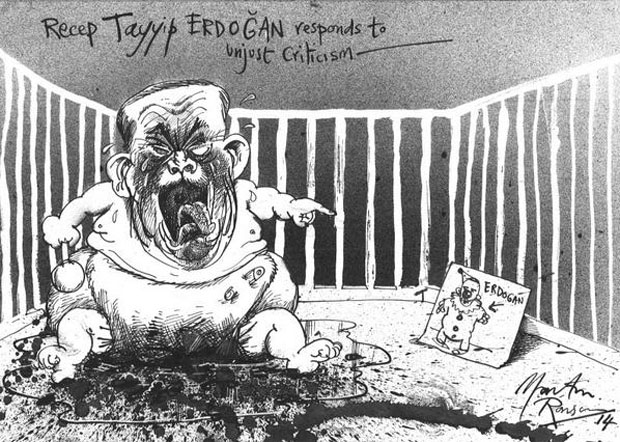
By: Martin Rowson
The online campaign was started on Thursday by Martin Rowson, cartoonist for The Guardian, The Independent and Index on Censorship among others, as Kart was scheduled to appear in court.
Erdogan himself filed the complaint against Kart over a cartoon published in the daily Cumhuriyet on 1 February 2014 showing the then prime minister as a hologram watching over a robbery. This was a reference to his alleged involvement covering up a high-profile graft scandal.
Erdogan claimed Kart was guilty of “insulting through publication and slander,” reports Today Zaman. And while the court initially ruled that there were no legal grounds for action, this decision was revoked following complaints from Erdogan’s lawyer. Kart was also fined in 2005 for drawing Erdogan as a cat.
In court on Thursday, Kart stated: “Yes, I drew it [the cartoon] but I did not mean to insult. I just wanted to show the facts. Indeed, I think that we are inside a cartoon right now. Because I am in the suspect’s seat while charges were dropped against all the suspects [involved in two major graft scandals]. I need to say that this is funny.”
He was finally acquitted, but many of his fellow cartoonists has already shared their artistic interpretations of Erdogan and the case.
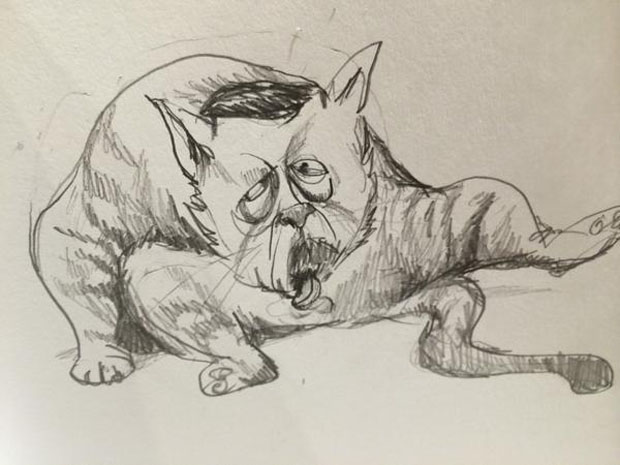
By: Morten Morland
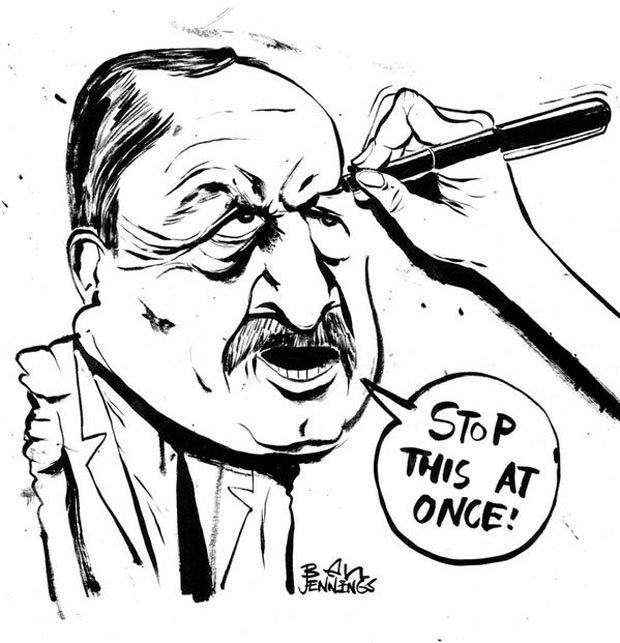
By: Ben Jennings
“I was alerted to Musa Kart’s plight by the excellent Cartoonists’ Rights Network International (CRNI) and previously, when an Iranian cartoonist was sentenced to 40 lashes, a bunch of us got together to draw the offended politician who’d had him arrested, the sentence was commuted,” Martin Rowson told Index via email.
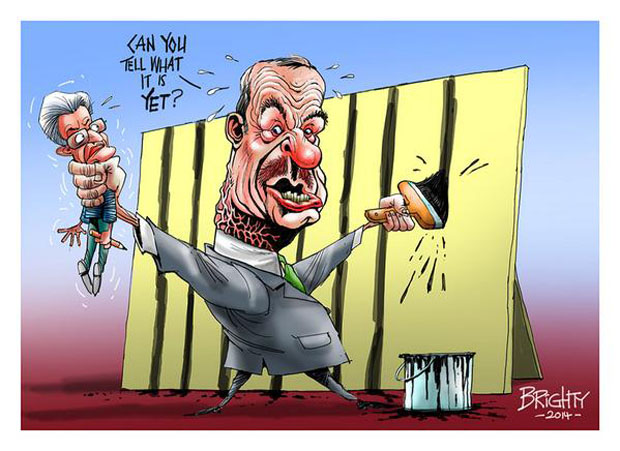
By: Steve Bright
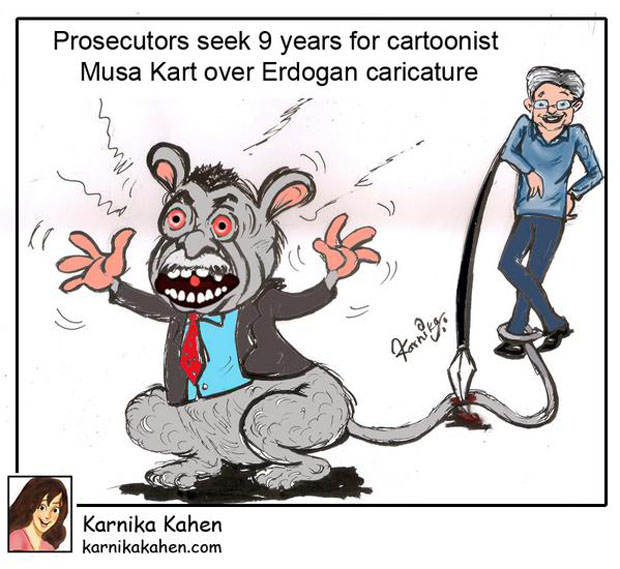
By: Kanika Mishra
“It seems this kind of international bullying by cartoon does have an effect, as even the chippiest despot out there can usually detect a batsqueak of the shamefulness of not being able to take a joke. In Musa Kart’s case, the threat of up to nine years in prison was such an outrageous abuse of power I didn’t wait for anyone else to organise this and simply put out a call via Twitter for cartoons of Erdogan to show solidarity. No idea if it had any effect on the court (I doubt it) though it may put Erdogan off the idea of taking the case to a higher court. I hope so. And I hope it gave Musa Kart a feeling that he wasn’t on his own in there. Basically, this is cartoonists playing the Spartacus card, because if one of us, anywhere, is persecuted for laughing at power, we all are,” said Rowson.
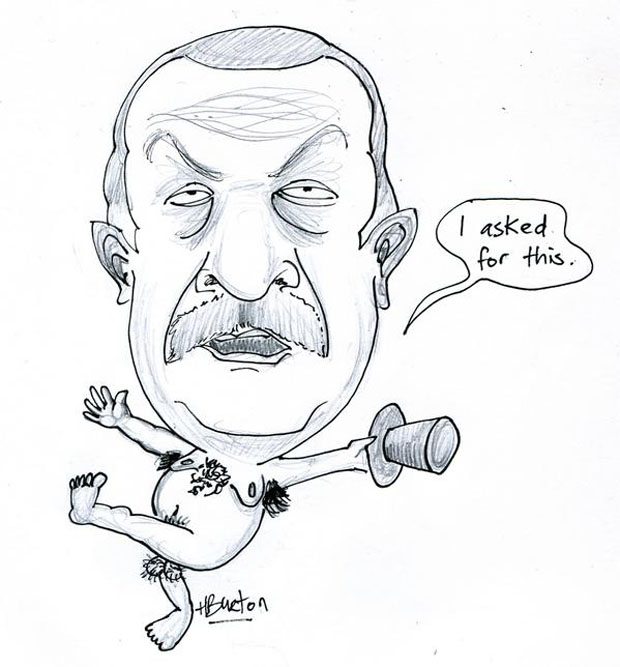
By: Harry Burton
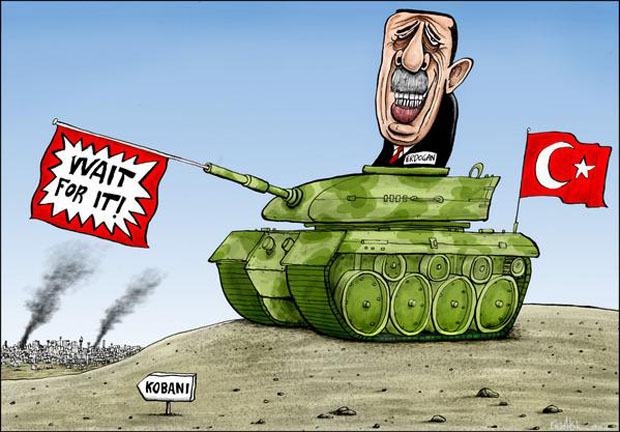
By: Brian Adcock
“Cartoonists are often the last bastion of free speech in repressive regimes and equally valued for telling the truth as it is, in democratic societies too; some consider their work to be of just as much value, if not more, as journalists, and many respected for the courage and ability to often say and report what others cannot, or fear to do, alongside the just as valued use of satire to reveal a truth which otherwise might not see the light of day,” Patricia Bargh from CRNI explained to Index in an email.
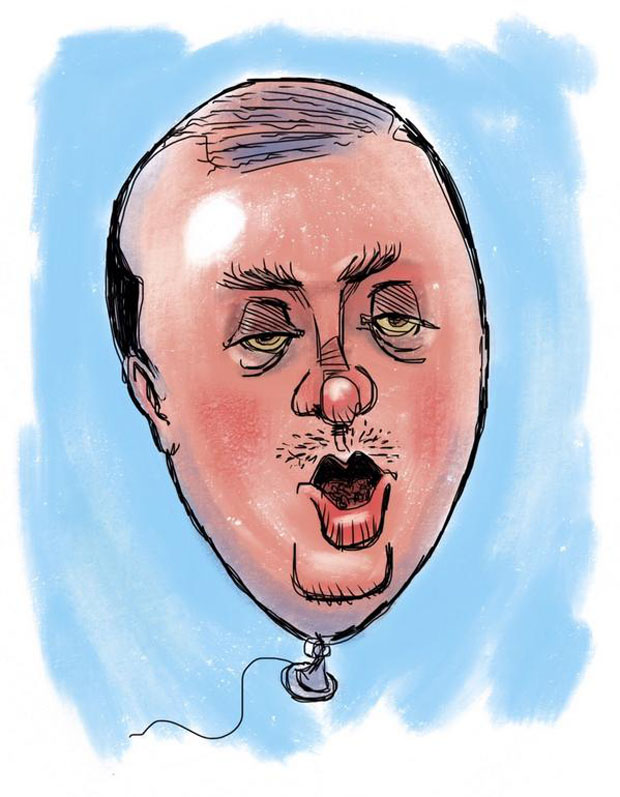
By: Mike Roberts
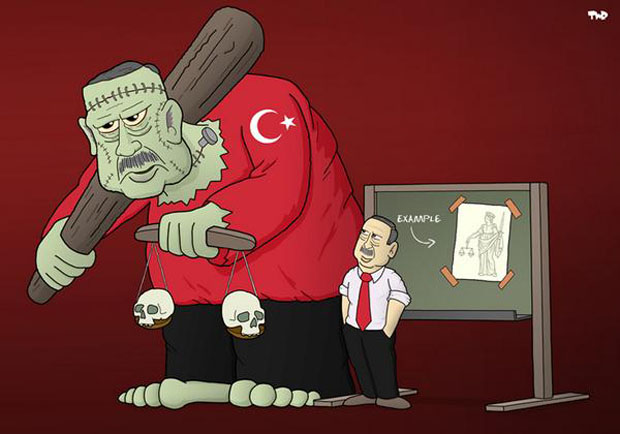
By: Tjeerd Royaards
“Thus as societies we should value and protect their right to do what they do, and if they know there is an organisation out there who will take up their case, should they be targeted, we hope that gives them the confidence to continue to on and assists them in their valuable work too,” Bargh added.
This article was originally posted on 20 October at indexoncensorship.org









